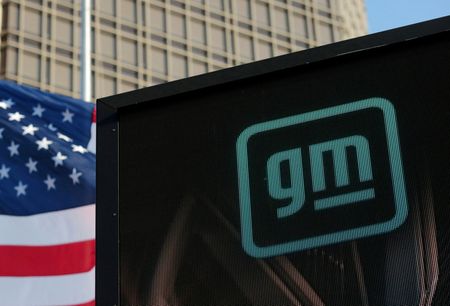 1
1 1
1


By Abhijith Ganapavaram
(Reuters) -General Motors Co surpassed Toyota Motor Corp in second-quarter U.S. car sales, data on Friday showed, even as persistent chip shortages and supply-chain disruptions crimped automakers’ ability to meet pent-up demand.
GM, which lost its crown as the U.S. sales leader last year for the first time since 1931 to Toyota, said it sold 582,401 vehicles in the quarter through June, 15% lower than a year earlier.
Toyota, which has been one of the worst hit automakers this year from supply chain disruptions and China’s COVID-19 lockdowns, sold 531,105 vehicles, down 22%.
The U.S. auto industry is struggling to keep up with pent-up consumer demand for new cars.
This was again evident on Friday when GM said it had nearly 100,000 vehicles waiting for more parts, which forced it to offer a weak second-quarter profit guidance. (https://bit.ly/3yA3fWt)
“Second-quarter vehicle wholesale volumes were impacted by the ongoing semiconductor supply shortage and other supply chain disruptions mostly in June,” GM said. (https://bit.ly/3nsB3P3)
The Detroit automaker, however, kept its full-year profit guidance, as it expects to sell those vehicles to dealers before the year-end.
The company expects second-quarter net income of $1.6 billion to $1.9 billion, missing analysts’ expectations of $2.56 billion, as per Refinitiv data.
GM sold over 7,300 electric vehicles in the quarter, including the GMC Hummer pickup truck, whose production is set to gradually rise in the second half.
The company is expected to sell the most new vehicles in the quarter, according to Cox Automotive, as industry-wide disruptions crimp inventory at other major automakers.
South Korea’s Hyundai Motor Co reported quarterly sales of 184,191 vehicles, down 23%.
Ford Motor Co , which reports on Tuesday, is expected to post a rise in quarterly sales, as it has managed its inventories better than most others and is also recovering from last year’s struggles, as per Cox Automotive.
Tesla Inc will be the only major brand to increase sales in the first half of the year, Cox added.
Industry observers are concerned about the potential impact of a multi-decade high inflation and rising gas prices on the auto industry, though they point out that demand remains strong at present, an unusual situation.
A bigger impediment to increasing auto sales at present still appears to be industry-wide shortages of cars and trucks, which have led to analysts cutting their full-year sales forecasts.
(Reporting by Abhijith Ganapavaram in Bengaluru, additional reporting by Nathan Gomes and Ben Klayman in Detroit; Editing by Shinjini Ganguli, Anil D’Silva and Maju Samuel)